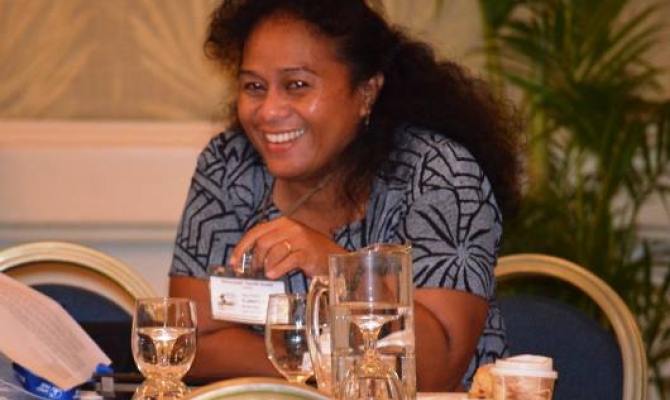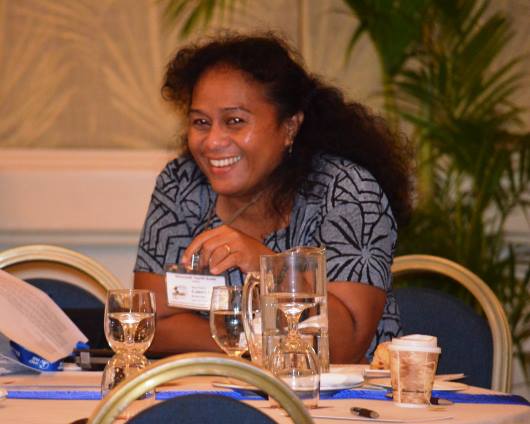
Climate Change Resilience
5 July 2013, Nadi, Fiji - While regional climate change talks take place in Nadi, the impacts of climate change are already being felt all over the Pacific.
Kiribati, a low lying Pacific nation that comprises of a group of 33 islands has voiced their experiences of fluctuating weather events.
"This has impacted on the pattern of the wet and dry seasons where there are cases of some islands having increased occurrence of rainfalls," said Kiribati's Acting Director of Environment & Conservation Division, Nenenteiti Teariki-Ruatu in an interview today.

"That's why Kiribati is keen to see the outcome of this week's meeting in facilitating and enhancing any support mechanism to implement relevant activities at the country level."
Ruatu is part of Kiribati delegation at the three-day 4th Pacific Climate Change Roundtable.
She said her country is raising awareness by investing in enhancing communication, education and public awareness of climate change at the national and community level.
She said the continued and consistent efforts by Government to lead the climate change campaign is very important.
"The Government of Kiribati has put climate change as a national priority," she said.
"Adaptation is the major important issue in Kiribati, where hard and soft options are concerned. While Kiribati is focusing on adaptation, mitigation is also of importance."
She said this is shown in Kiribati's national commitment through the designation of the Phoenix Islands Protected Areas (PIPA), which play a key role in climate change mitigation.
She said there is also the implementation of the Kiribati Adaptation Programme III (KAP III) that integrates both hard and soft measures to addressing climate change issues at national and outer islands level, and the Cabinet approved National Climate Change & Climate Change Adaptation Framework & the Kiribati Integrated Environment Policy (KIEP) this year.
Ruatu also talked about the establishment of the Kiribati National Expert Group on Climate Change and its involvement in the formulation of the Kiribati Joint Implementation Plan (KJIP).
"We make submission of national obligatory reporting to both the United Nations Framework Convention on Climate Change & United Nations Convention on Biological Diversity, which reports on national progresses made including identification of opportunities and challenges that Government of Kiribati continue to face, to fulfil its obligations as Parties to both Conventions."
Ruatu said there are existing key policies in place that provides direction to Government to tackle the multi-disciplinary issues surrounding climate change at the country level that includes the cabinet approval of the National Climate Change & Climate Change Adaptation Framework & the Kiribati Integrated Environment Policy (KIEP) this year.
The voice of the Pacific Calling Partnership, which is a Non-Governmental Organisation, was also heard in support of the Kiribati islands.
The NGO's Pacific Outreach Officer, Maria Timon Chi-Fang said their organization, which is based in Australia, works closely with the Government of Kiribati in addressing climate change.

"Our organization has visited areas in Kiribati that are obviously showing signs of the effects of climate change and also work with communities through NGOs," she said.
"The community in Kiribati is very aware of the effects as they are living in one of the islands that is most vulnerable to climate change impacts.
"Unfortunately, for the communities in Kiribati they almost have no option but to adapt to the issue."
Kiribati, a low lying Pacific nation that comprises of a group of 33 islands has voiced their experiences of fluctuating weather events.
"This has impacted on the pattern of the wet and dry seasons where there are cases of some islands having increased occurrence of rainfalls," said Kiribati's Acting Director of Environment & Conservation Division, Nenenteiti Teariki-Ruatu in an interview today.

"That's why Kiribati is keen to see the outcome of this week's meeting in facilitating and enhancing any support mechanism to implement relevant activities at the country level."
Ruatu is part of Kiribati delegation at the three-day 4th Pacific Climate Change Roundtable.
She said her country is raising awareness by investing in enhancing communication, education and public awareness of climate change at the national and community level.
She said the continued and consistent efforts by Government to lead the climate change campaign is very important.
"The Government of Kiribati has put climate change as a national priority," she said.
"Adaptation is the major important issue in Kiribati, where hard and soft options are concerned. While Kiribati is focusing on adaptation, mitigation is also of importance."
She said this is shown in Kiribati's national commitment through the designation of the Phoenix Islands Protected Areas (PIPA), which play a key role in climate change mitigation.
She said there is also the implementation of the Kiribati Adaptation Programme III (KAP III) that integrates both hard and soft measures to addressing climate change issues at national and outer islands level, and the Cabinet approved National Climate Change & Climate Change Adaptation Framework & the Kiribati Integrated Environment Policy (KIEP) this year.
Ruatu also talked about the establishment of the Kiribati National Expert Group on Climate Change and its involvement in the formulation of the Kiribati Joint Implementation Plan (KJIP).
"We make submission of national obligatory reporting to both the United Nations Framework Convention on Climate Change & United Nations Convention on Biological Diversity, which reports on national progresses made including identification of opportunities and challenges that Government of Kiribati continue to face, to fulfil its obligations as Parties to both Conventions."
Ruatu said there are existing key policies in place that provides direction to Government to tackle the multi-disciplinary issues surrounding climate change at the country level that includes the cabinet approval of the National Climate Change & Climate Change Adaptation Framework & the Kiribati Integrated Environment Policy (KIEP) this year.
The voice of the Pacific Calling Partnership, which is a Non-Governmental Organisation, was also heard in support of the Kiribati islands.
The NGO's Pacific Outreach Officer, Maria Timon Chi-Fang said their organization, which is based in Australia, works closely with the Government of Kiribati in addressing climate change.

"Our organization has visited areas in Kiribati that are obviously showing signs of the effects of climate change and also work with communities through NGOs," she said.
"The community in Kiribati is very aware of the effects as they are living in one of the islands that is most vulnerable to climate change impacts.
"Unfortunately, for the communities in Kiribati they almost have no option but to adapt to the issue."